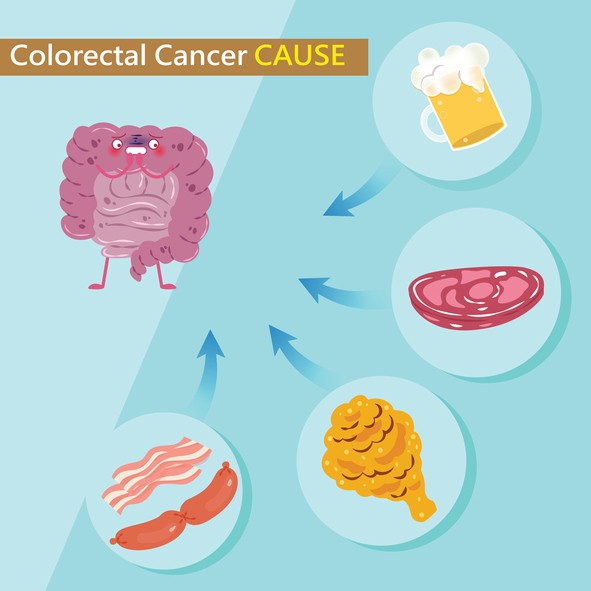Role of Diet in Colon Cancer
Poor diet increases the risk of several types of cancer, but most commonly that of the colon. Colon cancer occurs when tumours form in the lining of the large intestine and it is most commonly seen in men and women beyond the age of 50 years. Diet has been found to have an important role in the development of colon cancer. Since colorectal cancer is the fourth leading cause of cancer – related deaths all over the world, it is important to understand the role of the diet so that the risk of mortality can be reduced. It has been found that a diet rich in red meats or processed meats increases the risk of colorectal cancer by up to 18 %. While meat has been found to have a causative role, certain food items like fresh fruits and vegetables have a protective role, and thus help to lower your risk of colon cancer.

A diet rich in saturated or trans – fats is associated with a greater risk of colorectal cancer. These types of fats are contained in processed meats like ham, salami, hot dogs, bacon, etc. Consuming these foods increases the levels of free fatty acids in the body since they are immensely rich in fats. Consuming these foods also elevates the levels of bile acids. Bile acid, is then, metabolised by the microbes present in the gut to generate secondary bile acids in the body. It has been ascertained that secondary bile acids promote the process of carcinogenesis, that is, they increase the production of cancerous cells in the body by facilitating cellular changes in the normal cells. Increased pro – inflammatory effectors mediated via COX – 2 pathways is what causes these changes in the cellular morphology. Further, foods rich in trans – fats lead to oxidative stress in the body, which increases the activity of free radicals causing aggressive changes within the cells in the body. Oxidative stress is caused due to the release of compounds like hydrogen sulphide, which are toxic to the mucosa of the colon.
Consuming red meat has been found to be the major risk factor of colorectal cancer. During the process of cooking of this meat, compounds such has heterocyclic amines are produced, which have been found to have a carcinogenic effect on the cells of the colon. Studies have found a two – fold greater risk of colorectal cancer in individuals who ate red meat more than once a week than in individuals who ate it less often. The lesser the amount and frequency of consumption of red meat, the lesser is the risk of colorectal cancer with the risk being almost negligible in occasional consumers.
But, what about the amount, how do you know, how much is too much? Well, it has been determined that as less as 50 grams of processed red meat can significantly increase your risk of colorectal cancer. And this amount is contained in as little as 4 pieces of bacon or just a single sausage, so, even a standard breakfast meal containing red meats is enough to elevate your risk. This concludes that eating red meats even in small amounts each day can increase the risk of colorectal cancer.
Other than the amount and frequency of consumption, the method of cooking meat also determines the level of risk. Fried and darkly - browned surface of the meat leads to a greater risk of colorectal cancer than a lightly - browned surface. In fact, well – done grilled red meat has been identified as the main contributor to colorectal cancer. So, in order to reduce your risk of colon cancer, it is important that you reduce your consumption of red meats along with modifying your methods of preparation.
Increasing daily consumption by almost 100 gram increases the risk of colorectal cancer by up to 12 to 17 %. While this has been established for red meat, increase in overall meat consumption has not evidenced a similar effect. This implies that other types of meat like white meats, chicken, birds and seafood like fish and oysters are relatively safe for consumption and must be included in your diet.

Along with white meats, fair consumption of fruits and vegetables in your diet can lower your risk of colorectal cancer. High consumption of fruits and vegetables helped in lowering the risk of colorectal cancer by almost 32 %. Dietary fibres contained in wheat bran fibre and whole grain foods are also associated with a lower risk of colorectal cancer, but, the evidence has been inconclusive. The possible mechanism by which these foods help is by inhibiting the proliferation of cancerous cells in the body by causing them to die through the mechanism of apoptosis or programmed cell death.
Vitamin D and calcium have also been estimated to have some sort of protective role against colon cancer. In individuals with lower intake of calcium, that is lesser than 700 to 1000 mg per day, a higher incidence of colorectal cancer has been reported. Mild supplementation with calcium and vitamin D helps to lower the risk of colorectal cancer as suggested by researchers. Vitamin D has been found to be particularly helpful in cases of cancer which have been mediated through inflammatory pathways. Other than this, some studies have also found foods containing selenium and curcumin have a protective role against colon cancer.
All in all, diet has a significant role in determining your risk of colorectal with some kinds of food having the potential to increase your risk while others helping in lowering your risk. In order to prevent colon cancer, it is advisable to increase your intake of fresh fruits and vegetables along with fibre, vitamin D and calcium while lowering your intake of red meats and processed meats in your diet. If you are a predominant non – vegetarian, you can still safely consume white meats, seafood and eggs in moderate amounts without worrying about increasing your risk of colon cancer. Along with this, it is also imperative to limit alcohol intake and cease smoking to protect yourself from the risk of colon cancer among other cancers.
Author Bio: Dr. Garvita Arora is a qualified dental surgeon and an avid writer. With 500+ articles and medical blogs, she has written on a variety of topics, which have been of immaculate interest to her readers. Exploring new domains, she has now collaborated with CancerBro as a guest writer and is immensely dedicated to her work.


